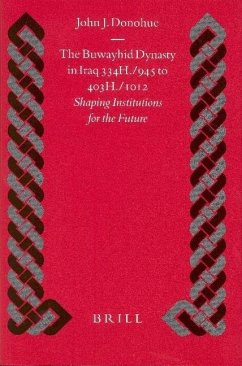A study of the development of political and social institutions in Baghdad, center of the Abbasid Caliphate, in that neglected period between Abbasid collapse and the coming of the Seljuk Turks. Three brothers, Daylemite mercenaries from the southern Caspian succeeded in establishing a dynasty that lasted nearly a century, controlling Iraq, a good part of Iran and the Gulf. The period has been labled the "Iranian intermezzo" but careful examination shows that the dynasty shaped the basic institutions to which the Seljuks would fall heir: the chief amirate, the system of army fiefs and the bureaucracy. It was a period of profound change and dislocation which fostered an open and creative cultural atmosphere. The Caliphate, bereft of power, was re-established as the center of authority and legitimation.
Hinweis: Dieser Artikel kann nur an eine deutsche Lieferadresse ausgeliefert werden.
Hinweis: Dieser Artikel kann nur an eine deutsche Lieferadresse ausgeliefert werden.








